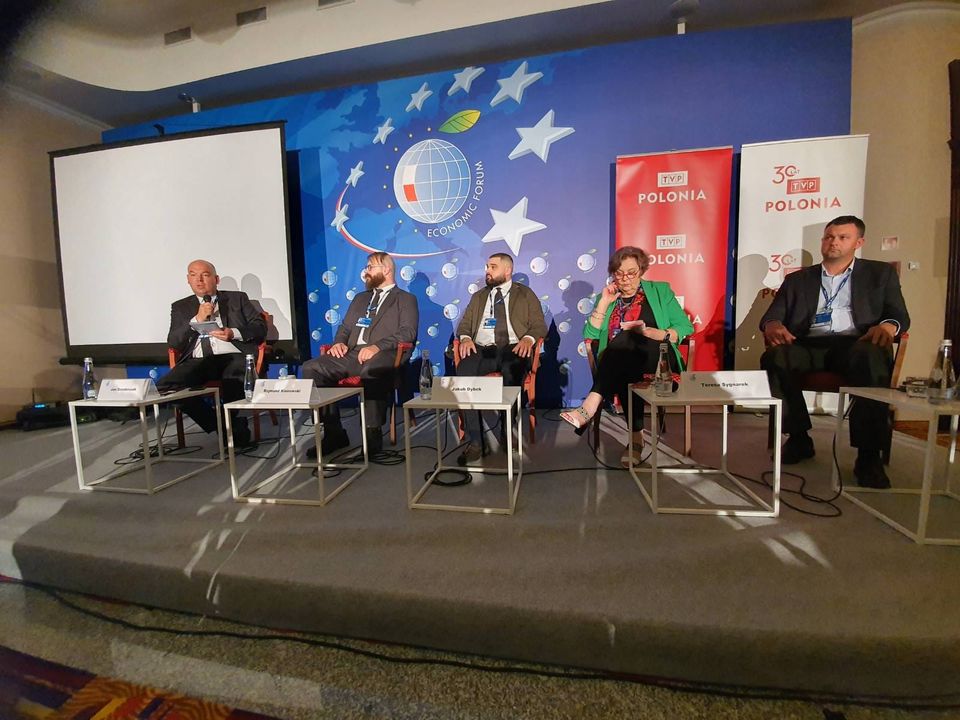
“We must be proud of who we are and what we do every day” – ed. Mirosław Ciunowicz, director of TVP Wilno said during the panel „Polish diaspora media as a creator of preserving Polish identity abroad”, which took place as part of the 32nd Economic Forum in Karpacz.
Referring to the contemporary challenges faced by the Polish diaspora media, editor Rajmund Klonowski, President of the Federation of Polish Media in the East, emphasized that “at the moment, the topic No. 1 is the Russian attack on Ukraine”. “Our role becomes the role of informing other media communities, what threats await our colleagues” – he said, adding that “Andrzej Poczobut is in prison for being guided by journalistic ethics”. “For an effective diaspora, we need to know what kind of nation we are and what we represent” – he pointed out.
In his opinion, the basic role of the Polish diaspora media “is to be ambassadors of Polishness in other journalistic organizations to which we belong”. “As a Federation, we nominated Andrzej Poczobut for the Otto von Habsburg award and he received it” – recalled Klonowski. He emphasized that thanks to this, many media that did not know Andrzej Poczobut began to write about him, as well as about Polish cemeteries that are being run over by the Russians.
Referring to the tasks of the Polish media in the field of resisting the actions of the Russians, the president of the Federation of Polish Media in the East noted: “We are talking here not only about propaganda, i.e. content that is contrary to the Polish raison d’état, but about broadly informing the public to ‘counter Russian disinformation'”. At the same time, he pointed to the 3D strategy used by the Russians, i.e. disinformation, disintegration and destruction.
“Journalist is not a profession, but a vocation” – he concluded.
The Russians are working to dismantle Polishness
“How do the Russians influence the dismantling of our Polishness?” – asked Mirosław Ciunowicz, director of TVP Wilno, referring to a similar question asked by the panel leader, Minister Jan Dziedziczak, who is responsible for contacts with the Polish diaspora. And he replied, “These are the three ‘D’s the editor was talking about”. “Please note that our Polishness is a constant struggle and we have it in our DNA. We have this struggle both passive and active. In the west it is perhaps more passive, in the east it is more active. What does it look like? For example, the situation in Belarus: introducing disinformation by the Lukashenka regime that, for example, we had two Polish unions in Belarus, discrediting, slandering our Polish community leaders, Mrs Andżelika Borys. I remember a story that they planted some drugs on her at the border when she was crossing it on her way to Poland. What action did we have to launch in Poland to defend her. For example, taking away infrastructure, Polish houses. All this is aimed at showing that we Poles are a weak nation, unbelievable, that we live in the border area, so we are petty smugglers. Lukashenka’s latest action that Poland is so bad, that there is even lack of salt. This is a constant struggle and we in the media must first resist. We must immediately say that this is not the case, that we are not a weak nation at all, that our culture is not worse than other cultures” – he explained.
“Polish media are strong and they really have to fight back” – the director of TVP Wilno noted. Ed. Mirosław Ciunowicz also pointed out that “we are dealing with huge Russian propaganda and huge Russian disinformation”. “We have a very large information content in Lithuania, which is produced on behalf of the Kremlin and we have to face it. It is difficult, because it is very complicated, very cleverly wrapped in such a litmus paper, and our nation – I am talking about the Lithuanian nation, but also Latvian and Estonian – partially swallows it. You have to skilfully demine this information pulp and show that it is simply a forgery and tell what the truth is” – he said. “It is difficult” – he admitted.
The head of TVP Wilno also referred to other tasks facing the Polish diaspora media today. “Building a good image in the country where we live – this is our mission. This is a task in our DNA code” – he said, emphasizing that “we live this Polishness. This Polishness must be awakened from the lethargy in which the Soviet Union put us to sleep”. He pointed out that ordinary people are involved in the programs of TVP Vilnius, and thanks to this they live Polish culture and language. “We must be proud of who we are and what we do every day” – he concluded.
Anna Wiejak
